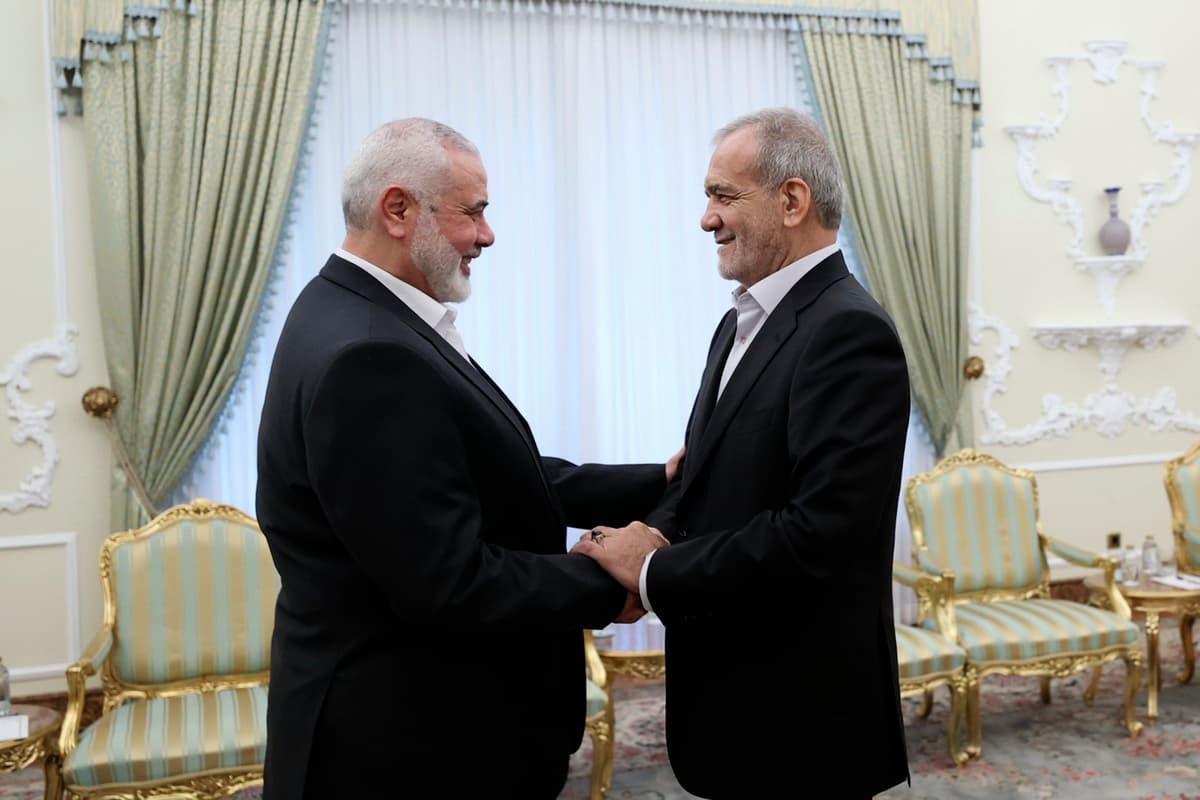Hamas Leader Ismail Haniyeh Killed in Iran by an Alleged Israeli Strike, Raising the Prospect of Escalation
The strike comes just after Ismail Haniyeh attends the inauguration of Iran’s new president at Tehran — and only hours after Israel targets a top commander of Hezbollah.

BEIRUT — Hamas leader Ismail Haniyeh was killed by a predawn airstrike at the Iranian capital Wednesday, Iran and the terrorist group said, blaming Israel for a shock assassination that risks escalating the conflict even as America and other nations were scrambling to prevent an all-out regional war. Iran’s supreme leader vowed revenge against Israel.
There was no immediate comment from Israel, which has pledged to kill Haniyeh and other Hamas leaders over the group’s October 7 attack on southern Israel. The strike came just after Haniyeh had attended the inauguration of Iran’s new president at Tehran — and only hours after Israel targeted a top commander in Iran’s ally Hezbollah at the Lebanese capital Beirut.
The dramatic assassination of Hamas’s top political leader threatened to reverberate throughout the region’s intertwined conflicts. Most explosively, a retaliation by Iran would push Iran and Israel into direct conflict if Iran retaliates.
“We consider his revenge as our duty,” the Iranian supreme leader, Ayatollah Ali Khamenei, said in a statement on his official website. He said Israel had “prepared a harsh punishment for itself” by killing “a dear guest in our home.”
Bitter regional rivals, Israel and Iran risked plunging into war earlier this year when, in April, Israel hit Iran’s embassy at Damascus. Iran retaliated and Israel countered in an unprecedented exchange of strikes on each other’s soil, but international efforts succeeded in containing that cycle before it spun out of control.
Haniyeh’s killing could also prompt Hamas to pull out of negotiations for a cease-fire and hostage release deal in the ten-month-old war in Gaza, which American mediators had said were making progress.
It could inflame already heightening tensions between Israel and Hezbollah — which international diplomats were trying to contain after a weekend rocket attack that killed 12 young people in the Israeli-controlled Golan Heights.
Tuesday evening, Israel carried out a rare strike in the Lebanese capital that it said killed a top Hezbollah commander allegedly behind the rocket strike. Hezbollah, which denied any role in the Golan strike, said Wednesday that it was still searching for the body of Fouad Shukur in the rubble of the building that was hit in a Beirut suburb, killing two women and two children, according to the Lebanese Health Ministry.
There was no immediate reaction from the White House to the killing of Haniyeh. Asked by reporters at Manila about the Tehran strike, Secretary Austin said he had no “additional information to provide,” but he expressed hope for a diplomatic solution on the Israeli-Lebanon border.
“I don’t think that war is inevitable,” he said. “I maintain that. I think there’s always room and opportunity for diplomacy, and I’d like to see parties pursue those opportunities.”
An Israeli military spokesman declined to comment. Israel often doesn’t comment on assassinations carried out by its Mossad intelligence agency or strikes on other countries.
Iranian press showed videos of Haniyeh and the Iranian president, Masoud Pezeshkian, hugging after the inauguration ceremony Tuesday. Hours later, the strike hit a residence Haniyeh uses at Tehran, killing him, Hamas said in a statement.
It also quoted a past speech by Haniyeh in which he said the Palestinian cause has “costs” and “we are ready for these costs: martyrdom for the sake of Palestine, and for the sake of God Almighty, and for the sake of the dignity of this nation.”
Mr. Pezeshkian vowed his country would “defend its territory” and make the attackers “regret their cowardly action.” An influential Iranian parliamentary committee on national security and foreign policy was to hold an emergency meeting on the strike later Wednesday.
Hamas’ military wing said in a statement that Haniyeh’s assassination “takes the battle to new dimensions and will have major repercussions on the entire region.” It said Israel “made a miscalculation by expanding the circle of aggression.”
Speaking to the AP, a Hamas spokesman, Sami Abu Zuhri, said the loss of Haniyeh won’t impact the group, saying it had emerged stronger after past crises and assassinations of its leaders.
Haniyeh left the Gaza Strip in 2019 and had lived in exile in Qatar. The top Hamas leader in Gaza is Yahya Sinwar, who masterminded the October 7 attack.
In the West Bank, the Palestinian president, Mahmoud Abbas, condemned Haniyeh’s killing, calling it a “cowardly act and dangerous development.” Political factions in Judea and Samaria called for strikes in protest at the killing.
Associated Press
